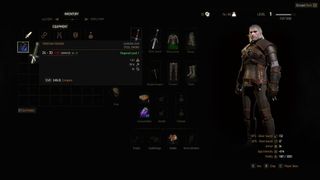Encumbrance sucks, so why is it still so common?
If everyone hates being over-encumbered, why do so many big games still rely on it to keep your inventory under control?
My least favorite sensation in all of gaming is when I'm playing an RPG, and I pick up a weapon, or a breastplate, or an incandescent bauble of no obvious importance, and suddenly my feet cement to the floor. My character is over-encumbered! I have to spend the next few minutes on the pause screen, deciding which knick-knacks in my inventory to leave abandoned on the side of the road. Once spry and light again, I continue my adventures deep into the murky chasms of whatever fantasy world I'm exploring, until inevitably I find another item I want and the exact same thing happens again.
Why do big games, particularly open world games with thousands of objects that can be picked up and examined, so often turn to a mechanic where fun goes to die?
I am not alone in hating encumbrance. It's a source of constant annoyance for gamers everywhere, to the point of achieving meme status in certain communities. And yet, it's still common. Bethesda makes two of the most popular single-player franchises around with The Elder Scrolls and Fallout, and yet we've all crossed our weight limit and hampered ourselves in the middle of a fight with a rowdy sect of Super Mutants. CD Projekt Red is one of this industry's few near-universally beloved studios, and yet Geralt always seems to be one looted corpse away from completely losing control of his body. There are cases where it makes sense, obviously—of course Dark Souls has an opaque encumbrance system, given all its other intentionally draconian quirks—but it certainly seems weird that such a despised mechanic is implemented, and re-implemented, over and over again.
Why do big games, particularly open world games with thousands of objects that can be picked up and examined, so often turn to a mechanic where fun goes to die? I figure there must be a reason. I'm constantly in awe of just how much work it takes to create videogames, and generally, when I find something to be stupid and unintuitive, I'm willing to hear the experts out. There must be some method to the madness, right?

Konrad Tomaszkiewicz, game director of The Witcher 3, outlined a few arguments for encumbrance when I emailed him. The first is probably the most obvious: Immersion. "Having a limit to how much equipment Geralt can carry plays a part in making the character and the world around him more believable," he says. "Yes, you’re playing as a professional monster slayer. He’s very strong, stronger than normal humans, due to experiments and mutations witchers have to endure throughout their rigorous training. But even then, Geralt has limits. It’s a small touch that packs a lot of punch for the role-playing aspect of an RPG."
Having a limit to how much equipment Geralt can carry plays a part in making the character and the world around him more believable.
Konrad Tomaszkiewicz
Tomaszkiewicz tells me that he believes the fundamental purpose of an RPG is to embody the central character fully. That's why, he says, some players choose to unequip all of their armor before taking Geralt for a dip in a river or a lake. "They want to live the fantasy the game is enabling them to live, while keeping the experience as close to authentic as possible," he explains. It's the belief of CD Projekt Red that functions like encumbrance, while occasionally annoying, add up to a world that feels more consistent.
Oscar López Lacalle, lead designer of the survival game Conan Exiles, offers a similar justification. Exiles is different from The Witcher, in the sense that it packs a crafting system that heavily relies on resource harvesting and management, which makes it a pretty natural fit for a weight limit. But Lacalle tells me that the team decided to opt for an encumbrance mechanic, rather than a traditional inventory page, because it opened up the flexibility—and yes, the authenticity—of how you fleshed out your character.
"For example, we can set items like explosives to be artificially heavy because that makes players think on the logistics of sieging rather than just bringing unlimited explosive jars or trebuchets to breach any wall while still being able to fight at peak capacity," he says. "We can also say that all our core resources are much lighter than specialty items to enhance the feeling of rarity and the relative worth of items when compared with each other. This becomes an important factor in situations like coming back to your base loaded with riches, or relocating your base to a new location in the map. In general, it's a powerful tool to enhance and promote certain aspects of the game without adding other, more aggressive limitations."
PC Gamer Newsletter
Sign up to get the best content of the week, and great gaming deals, as picked by the editors.

That's just the front end of things though. Tomaszkiewicz highlights a number of behind-the-scenes issues that make encumbrance systems necessary for a healthy experience. He mentions how too many items can clutter the UI, and that adding a limit helps "manage the chaos." Also, you can't ignore the fact that every piece of inventory takes up a sliver of memory, and for a game like The Witcher 3 that already asks a ton of your hardware, developers need to be frugal. "You've got to keep in mind what might happen performance-wise when players hoard insane amounts of items."
Lacalle swears up and down that encumbrance systems are not designed to make players uncomfortable. Instead, he hopes to simply coerce us into interesting choices. Exiles was specifically designed around the remaining weight a character will have access to after equipping a basic set of armor. What you do with that remaining space hollows out your place in the world, and your role in guilds. When he frames it like that, it sure sounds a lot more dynamic than simply choosing a class.
Lacalle swears up and down that he hopes encumbrance systems coerce us into interesting choices.
"We made heavy armor and certain weapons heavier—because we wanted to steer them towards the fighter archetypes—and certain materials heavier or lighter depending on how many are needed for typical activities and how rare they are supposed to be," he says. "For building pieces, we made them lighter than their material parts because we wanted players to commit to converting materials instead of amassing tons of raw resources, with a few hand-picked exceptions like Altars and Wheels of Pain. Finally and most importantly, sprinkle in some design voodoo (lots of testing and iterating) until it feels good!"
It's true that sometimes you don't know what you really want, and as much as it might sound fun to jog through The Northern Kingdoms with Geralt sucking up loot like a vacuum, I'm willing to admit that I might be misguided. However, it's clear that the world at large is not convinced.
Websites like Eurogamer and Motherboard have dedicated blog posts instructing on how to turn off encumbrance, ostensibly because there are so many people on the internet googling for answers. A mod that gives you infinite carry capacity in The Witcher 3 has been downloaded over 30,000 times (it's the third-most popular Witcher 3 mod on the Nexus). The "100x your carry weight" mod for Skyrim has been downloaded 380,000 times. The developers I spoke to are all reasonable people who make good points, but it's hard to shake that fundamental feeling that encumbrance only slows down our fun.

All that being said, maybe there's a way to make encumbrance better without completely purging it from the code. David J. Cobb has spent the bulk of his modding career tinkering with the nuts and bolts of Skyrim to create a more realistic, more demanding weight system, and he makes a strong point about how encumbrance is often poorly implemented. There's never any warning when you're about to become over-encumbered in Bethesda games. Your momentum comes to a screeching halt after you add one extraneous item to your inventory. "Like carrying hundreds of pounds of gear effortlessly, only to stop completely in your tracks because you decided to pick a flower on the side of the road," he says. He argues that instead of creating immersion, that breaks immersion.
Cobb came up with a set of checks and balances called Cobb Encumbrance that add progressive penalties to your speed and stamina as you add more weight to your character. Essentially, it's an uber-hardcore interpretation of the core Skyrim fantasy. Personally, that doesn't sound like my kind of thing, but it also feels a tad more honest than how most other games deal with encumbrance. Maybe it's not the answer, but it's certainly an answer.
"The encumbrance mechanic has to be viewed as part of the broader experience," says Cobb. "It influences and is influenced by everything around it."

Luke Winkie is a freelance journalist and contributor to many publications, including PC Gamer, The New York Times, Gawker, Slate, and Mel Magazine. In between bouts of writing about Hearthstone, World of Warcraft and Twitch culture here on PC Gamer, Luke also publishes the newsletter On Posting. As a self-described "chronic poster," Luke has "spent hours deep-scrolling through surreptitious Likes tabs to uncover the root of intra-publication beef and broken down quote-tweet animosity like it’s Super Bowl tape." When he graduated from journalism school, he had no idea how bad it was going to get.
Most Popular


